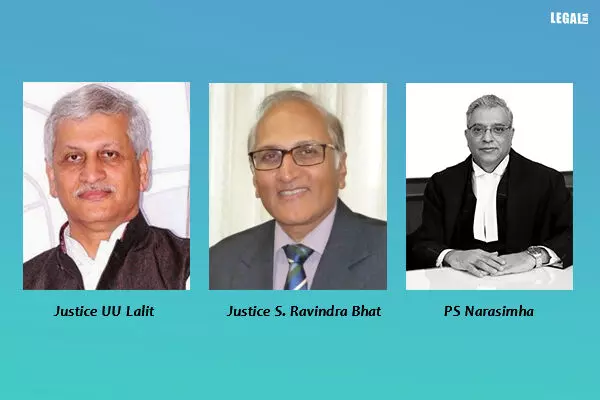- Home
- News
- Articles+
- Aerospace
- Agriculture
- Alternate Dispute Resolution
- Banking and Finance
- Bankruptcy
- Book Review
- Bribery & Corruption
- Commercial Litigation
- Competition Law
- Conference Reports
- Consumer Products
- Contract
- Corporate Governance
- Corporate Law
- Covid-19
- Cryptocurrency
- Cybersecurity
- Data Protection
- Defence
- Digital Economy
- E-commerce
- Employment Law
- Energy and Natural Resources
- Entertainment and Sports Law
- Environmental Law
- FDI
- Food and Beverage
- Health Care
- IBC Diaries
- Insurance Law
- Intellectual Property
- International Law
- Know the Law
- Labour Laws
- Litigation
- Litigation Funding
- Manufacturing
- Mergers & Acquisitions
- NFTs
- Privacy
- Private Equity
- Project Finance
- Real Estate
- Risk and Compliance
- Technology Media and Telecom
- Tributes
- Zoom In
- Take On Board
- In Focus
- Law & Policy and Regulation
- IP & Tech Era
- Viewpoint
- Arbitration & Mediation
- Tax
- Student Corner
- AI
- ESG
- Gaming
- Inclusion & Diversity
- Law Firms
- In-House
- Rankings
- E-Magazine
- Legal Era TV
- Events
- News
- Articles
- Aerospace
- Agriculture
- Alternate Dispute Resolution
- Banking and Finance
- Bankruptcy
- Book Review
- Bribery & Corruption
- Commercial Litigation
- Competition Law
- Conference Reports
- Consumer Products
- Contract
- Corporate Governance
- Corporate Law
- Covid-19
- Cryptocurrency
- Cybersecurity
- Data Protection
- Defence
- Digital Economy
- E-commerce
- Employment Law
- Energy and Natural Resources
- Entertainment and Sports Law
- Environmental Law
- FDI
- Food and Beverage
- Health Care
- IBC Diaries
- Insurance Law
- Intellectual Property
- International Law
- Know the Law
- Labour Laws
- Litigation
- Litigation Funding
- Manufacturing
- Mergers & Acquisitions
- NFTs
- Privacy
- Private Equity
- Project Finance
- Real Estate
- Risk and Compliance
- Technology Media and Telecom
- Tributes
- Zoom In
- Take On Board
- In Focus
- Law & Policy and Regulation
- IP & Tech Era
- Viewpoint
- Arbitration & Mediation
- Tax
- Student Corner
- AI
- ESG
- Gaming
- Inclusion & Diversity
- Law Firms
- In-House
- Rankings
- E-Magazine
- Legal Era TV
- Events
Supreme Court revokes High Court's order against OLX

Supreme Court revokes High Court's order against OLX
The online marketplace connecting the sellers and the buyers was earlier advised to adopt a screening mechanism
The Supreme Court has quashed the directions issued by the Punjab and Haryana High Court to OLX India. The high court had ordered the online platform to adopt a screening mechanism for the sellers who posted their advertisements.
A bench comprising Justice UU Lalit, Justice S Ravindra Bhat and Justice PS Narasimha said, "There was no reason for the high court to pass these directions, particularly without hearing the appellant."
The Punjab and Haryana High Court had earlier issued directions to OLX to delete and re-list all advertisements on its platform only after attaching an open PDF file along with each advertisement.
It ordered that the file should contain – at least two ID proofs of the person, proposing to sell a property (moveable or immoveable) or asking any professional service; two mobile numbers with a screenshot/photocopy of the message sent by the server that issued the SIM verifying the name of the owner as per their record; details of the (moveable or immovable) property to be sold and a document of the title like registration certificate or insurance paper for vehicles or sale deed for the property.
Other criteria were that in the five districts if the proposed seller was residing in a village or in the area of Municipal Corporation/Municipal Council, a certificate of the member of the Panchayat or Municipal Councilor certifying that the seller was not involved in any criminal case and was a genuine owner of the property was required.
The directions were passed while considering a case of a person impersonating another to upload an advertisement for the sale of a product on OLX.
OLX submitted before the apex court that it was only an intermediary making the services available so that the prospective vendors of goods and merchandise could issue appropriate advertisements soliciting responses from the intending purchasers. Therefore, it could not guarantee the quality of the goods or merchandise that were put up for sale. Also, it was not possible for it to certify the genuineness and correctness of the deals between the buyers and the sellers.
Refusing to comment on the contentions, the top court said, "Since the matter is pending consideration before the high court, we do not enter into and deal with the submissions advanced by the appellant. We leave the appellant to agitate all these issues before the high court."



